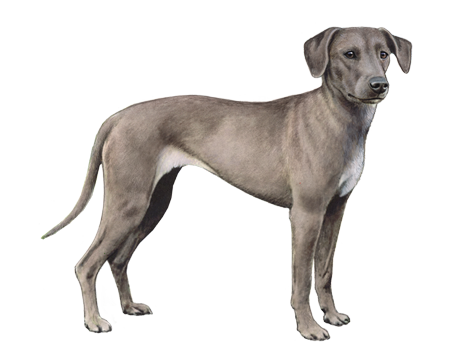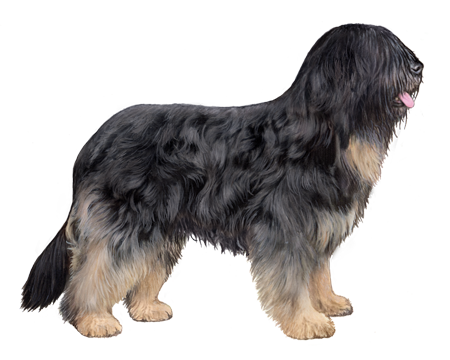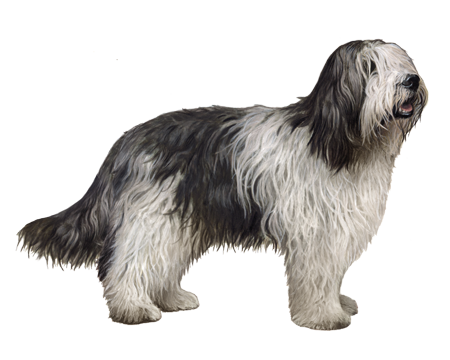
Lacy Dog
The Lacy Dog is a hardworking, alert working dog. Despite its frilly name, this is a hardy breed that needs room to run and a task to accomplish in order to satisfy its strong drive to work.
Interested in discovering if your dog is a Lacy Dog?
Check out Wisdom Panel's DNA tests.

Lacy Dog Traits
General Appearance
Lacy Dogs are medium-sized, muscular, active dogs with poised, alert appearances and intelligent expressions.
Coat and Coloring
Lacy Dogs have smooth, tight, sleek coats with a glossy appearance.
The dogs come in three colors: Blue, red, and tri-colored. The blue Lacy is light gunmetal gray to charcoal gray in color; the red Lacy is has coloring that ranges from red and yellow to cream; and the tri-colored Lacy has the light gunmetal gray to charcoal gray coloring of a blue Lacy with red points over the eyes, on the muzzle, under the tail, and down the legs.
Distinctive Physical Traits
Lacy Dogs have firm, muscular bodies with deep chests; strong loins; muscular shoulders; powerful legs and tails that are straight but can curl upward when the dog is alert. Their eyes are distinctive shades of yellow to orange (brown eyes are considered a fault).
Lacy Dog Temperament
Lacy Dogs are a highly driven working breed with natural protective instincts and energy to spare. These dogs are happiest when engaged in high-energy tasks and, without sufficient work, can become bored and destructive.
True to their roots, Lacy Dogs have strong herding instincts and may herd children or other pets; the same sense of smell that allowed the breed to excel at tracking prey could lead the Lacy Dog to run astray if it is not on leash or confined in a securely fenced area.


Lacy Dog History
In the 1858, Frank, George, Erwin, and Harry Lacy—the Lacy brothers—arrived in Marble Falls, Texas via covered wagon to establish a new homestead. The brothers needed a hardy dog to help with herding, hunting, tracking, and guarding livestock. The Lacy Dog, also known as the Blue Lacy, resulted from crossing several breeds that might have included a scenthound and the Greyhound with coyotes.
The Lacy Dog is believed to be the first breed to originate in Texas and earned the designation of Texas State Dog in 2005.
The decline in small ranches and the introduction of high-tech hunting and tracking tools have led the Lacy Dog nearer to extinction. However the breed, while still relatively unknown outside of Texas, retains all of the characteristics that made it a popular four-legged ranch hand and can still be found working alongside ranchers and hunters.
Lacy Dog Care
Nutrition
Feed Lacy Dogs a high-quality dog food that is appropriate for their life stage (puppy, adult, senior) and consider a diet formulated for active breeds. Portion out their food with a measuring up and limit treats to no more than 10 percent of their daily calories to avoid overfeeding.
Grooming
Thanks to their short coats, Lacy Dogs do not require much grooming. An occasional bath and brushing will help their soft, sleek coats look and feel their best. Lacy Dogs also require regular nail trims, ear cleanings, and a dental care routine that includes at-home teeth brushing and professional cleanings. Introducing these grooming essentials when Lacy Dogs are puppies can ensure they become lifelong habits.
Exercise
A walk around the block is not enough for a Lacy Dog. This is a high-energy working breed that prefers to be on the job—especially one that requires speed and stamina. If there are no cattle to herd or game to track, Lacy Dogs require other ways to burn off energy. They make great running or hiking companions and may enjoy swimming or agility.
Training
Training is a must. Lacy Dogs can be dominant, so training can help them understand their place in the pack and channel their boundless energy in positive directions. With consistent training, these intelligent, highly driven dogs can master commands and learn new tricks. They do best with calm, assertive—but never harsh—leadership, positive reinforcement, and rewards. Socialization can help the Lacy Dog feel more comfortable with unfamiliar people and situations.
Lacy Dog Genetic Health Conditions
-
Hyperuricosuria
Hyperuricosuria (HUU) is a condition that predisposes affected dogs to the formation of urinary stones, such as kidney or bladder stones.
Knowing if your Lacy Dog is a carrier or at-risk for these conditions can help you and your veterinarian plan for your pup’s lifelong care. With Wisdom Panel™ Premium, you can get results for over 200 genetic health tests.
Breed Group
Herding
The herding group is a diverse category. These highly intelligent breeds were developed to guard and control the movement of livestock.
Resources
http://www.nationalkennelclub.com/breed-standards/blue-lacy.htm
https://lacydog.com/breed-information
Reviewed July 26, 2020 by Cindy Elston, DVM, MPH





































































